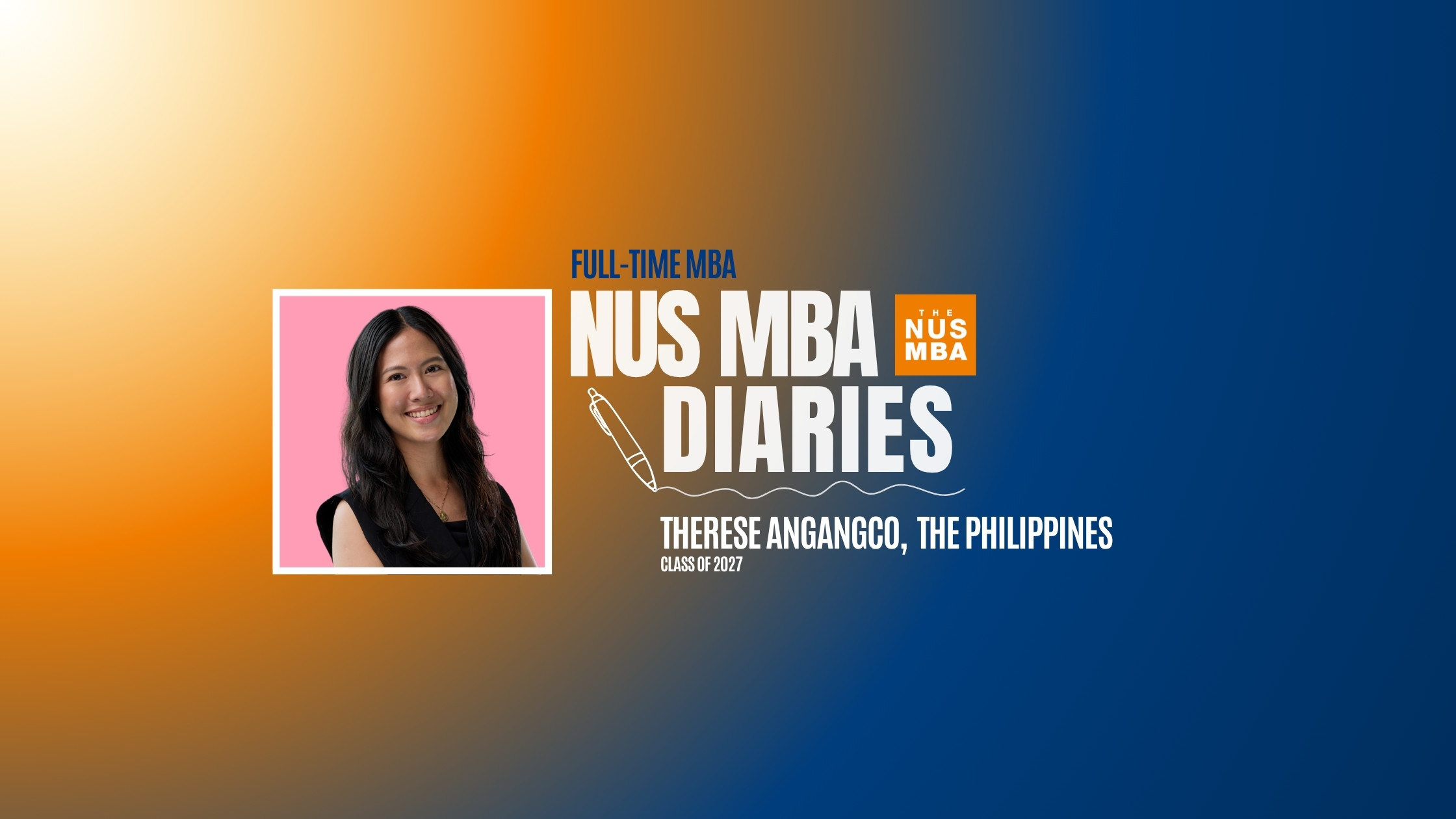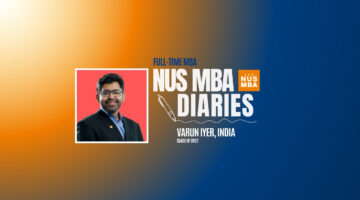The NUS MBA Diaries: Reflections from Therese Angangco

December Best of Both Worlds
December was split between two places, and I couldn’t have asked for better timing.
The month started in Singapore. We wrapped up the semester with an MBA cocktail party where everyone brought their own cocktails to share. It was a good way to close out the term with the cohort. A group of us also went to the Oceanarium, which was fun. I grabbed food with some public policy friends I’d randomly met in line at the visa office earlier in the semester. We got really good Indian food and apparently the best chicken wings, though I can’t remember where exactly. I squeezed in one more coffee chat before I flew out with Marie Cheong, Founding Partner of Wavemaker Impact.
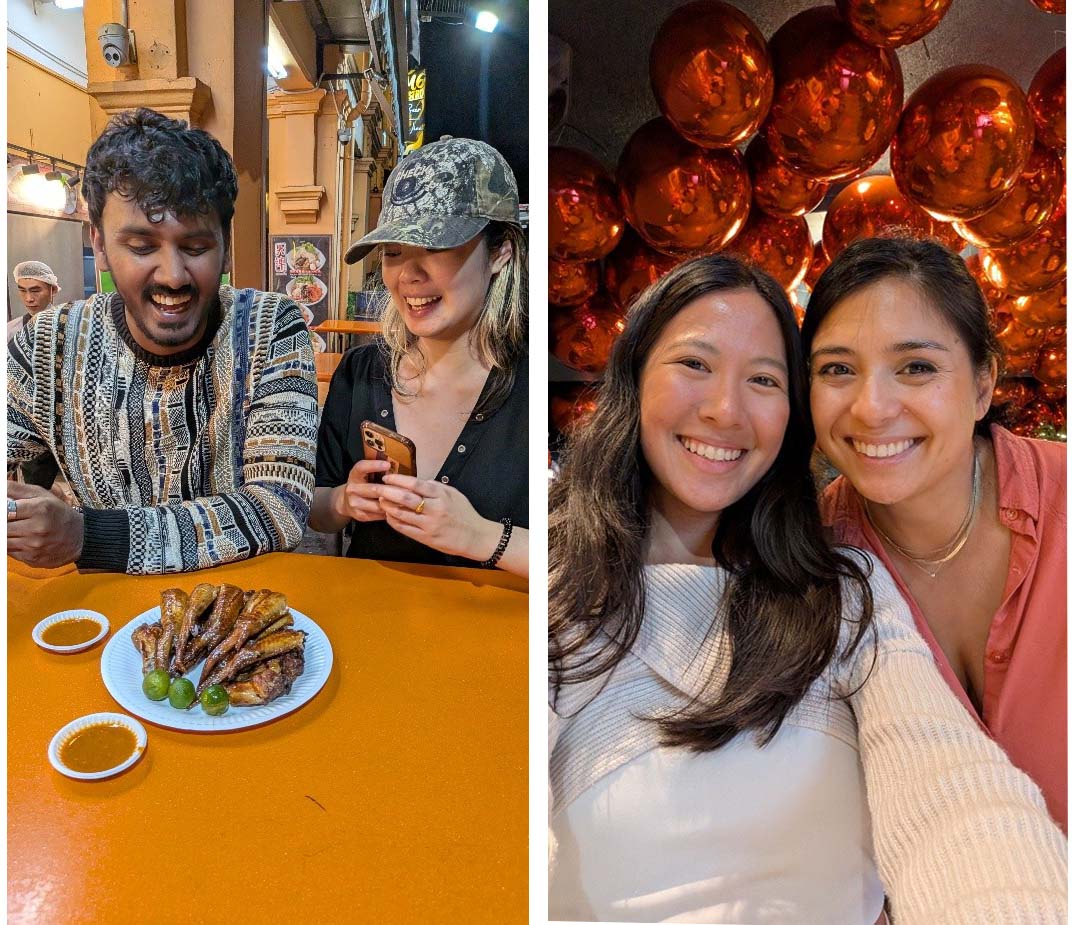
Then I flew back to Manila, and that’s when things got busy.
My friends threw me a bachelorette party. We played a lot of pickleball, which was exactly what I wanted. There was also a big family reunion, one of many we had that month. I squeezed in a coffee chat with Gino Borromeo, head of communications strategy at Ayala, which my classmate Josh set up. He told us his story about how he navigated going from communications to strategy, and it was helpful to hear how he made that shift. I also randomly bumped into Ayla Reyes, an NUS MBA alum from 2023, which was a nice surprise.
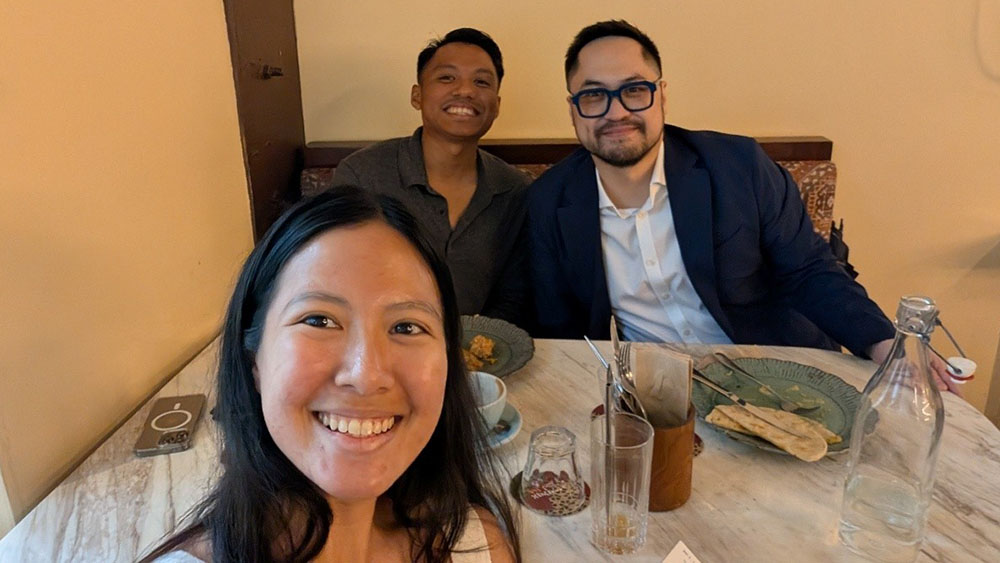
Coffee chat with Gino Borromeo (right), head of communications strategy at Ayala
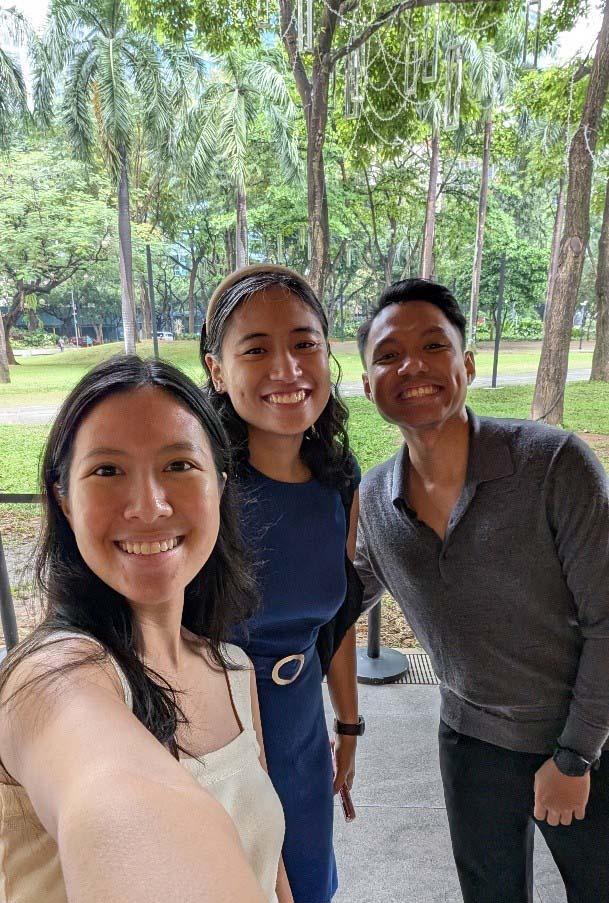
Surprise meeting with NUS MBA alumna, Ayla Reyes (middle).
I went to Surevax’s first Christmas party and two clinic openings! Surevax is the company my fiancé is building in the Philippines to help prevent the spread of rabies. It’s a real problem here since rabies is prominent and vaccinations in the ER are quite pricey. Seeing his team come together for the holidays was very nice.
December was full of wedding prep. I met with suppliers for rings, went to the dressmaker, had meetings for the logistics of our 250-person wedding happening in January. My cousin hosted trivia games throughout the month, including one at Christmas and another on New Year’s Eve, which became this fun thing we did with family and friends. We also celebrated my fiancé’s birthday with a golf weekend.
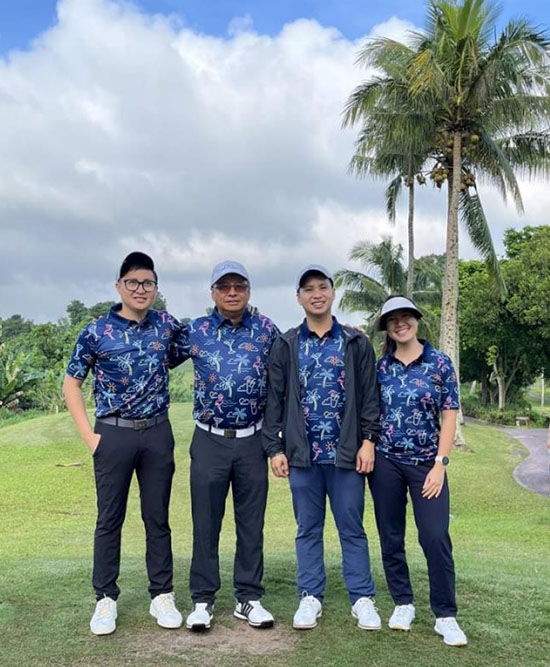
Golf weekend with my fiancé’s dad and brother
With the holiday break NUS MBA offered, I got the best of both worlds. The NUS MBA schedule is flexible enough that I could go home in December and handle everything I needed to handle. Wedding planning. Family time. Coffee chats with people building businesses here. Supporting my fiancé’s company. Being present for the people and things that matter.
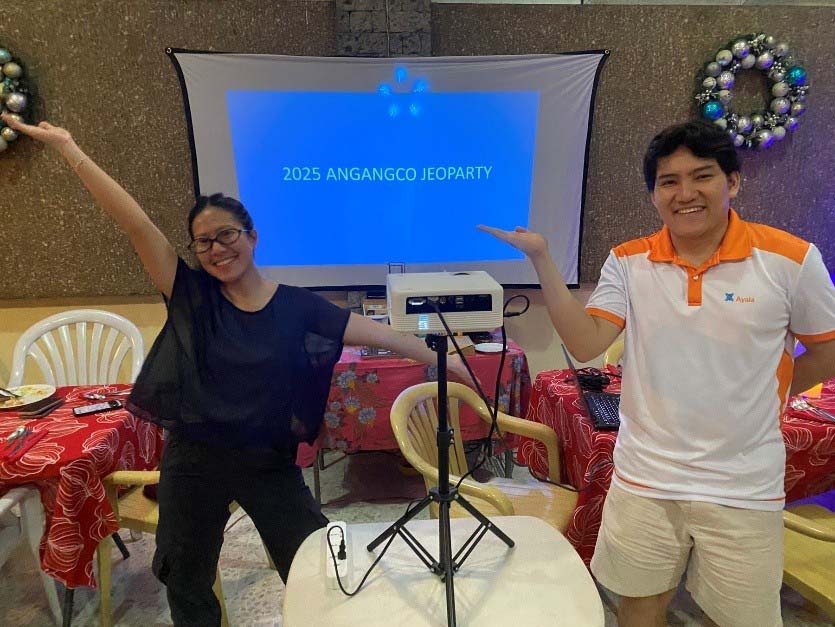
My cousin and I hosted a family jeopardy.
If I’d been locked into a program that didn’t allow me to go home, planning a 250-person wedding while my fiancé focused on building his business would have been nearly impossible. But because I’m from the Philippines and NUS is close enough that I can easily fly back, I got to do both. I got the MBA experience in Singapore and I got to be home when I needed to be home.
That’s not something I took for granted this month. A lot of people ask how I’m managing an MBA while planning a wedding and while my fiancé is building a startup. The honest answer is I’m lucky. Lucky that the program is flexible. Lucky that Singapore and Manila are a short flight apart. Lucky that I can show up for my education and show up for my life at the same time.
December reminded me why I chose this MBA and why I chose to do it now. It’s not just about what I’m learning in class or the connections I’m making in Singapore. It’s about being able to integrate all of it with the life I’m building. The wedding. The family. The business my fiancé is growing. The opportunities in Manila that I don’t want to miss.

November Forming my own Singapore Global Immersion Program
November went by fast. First half was exams and final classes. Second half was filled with bonding with MBA classmates, setting up coffee chats, and learning how to sail with the NUS Sailing Club. Other folks went to Dubai for their Global Immersion Program. Here in Singapore, we made our own.
The last class that stuck with me was Operations. Professor Joel had us all submit reflections, then wrapped up with a question I’m still thinking about. We’re a business school, so we need to look at P&Ls and optimize operations. But when you’re reviewing those numbers, “labor costs” aren’t just line items. They’re people with families and lives. How do you balance the business reality with treating people with respect? That’s the question. So far the answer I have is to treat people with respect. But I’m open to hearing other thoughts on this.

Then exams ended, and while most of my cohort flew to Dubai for GIP, a few of us stayed in Singapore. Figured we’d see what we could do here instead.
I met Julie Bulaklak at a Women in Tech event. She’s the ASEAN startup sales lead for Azure at Microsoft. We talked about how she got to where she is (she’s also from the Philippines), then got into conversations about the cloud and Azure’s strategy. She invited me to visit the Microsoft office, so I did. Got to see how they’re building their presence in Asia and their approach to startups in the region. Wasn’t on any official GIP schedule, just happened because I was able to make this connection at the event.
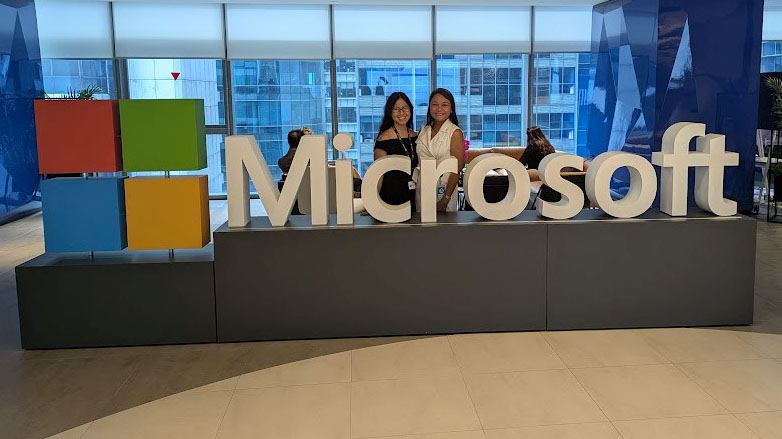
Some folks from my cohort and I were able to be invited to a coffee chat with Seatown, a private equity firm, through a connection I’d made in the Filipino community (thanks Bea!). Learned about their buy-and-build strategy, which is apparently pretty unique in Asia. It was very casual and just a good format to connect with their team and for everyone to ask their questions.

The most fun thing I did was learn to sail with the NUS Sailing team. First time sailing, and we capsized constantly. At first it was quite scary being in the water with the boat flipped, but after a few times it just became normal. They teach you how to recover from capsizing first because that’s what you need to know. Eventually we got better and stopped flipping as much.
My fiancé also came to visit during all this. It was my birthday, so he cooked mushroom risotto and my roommate cooked Japanese curry. He met all my friends and got to see what my life here actually looks like. A friend from the Philippines also came by to check out MBA schools, so I brought him to a talk at NUS on private equity by State Capital. Better to experience it than just read about it online. It was a very well-structured talk learning about specific deals they were working on and the day in their life.
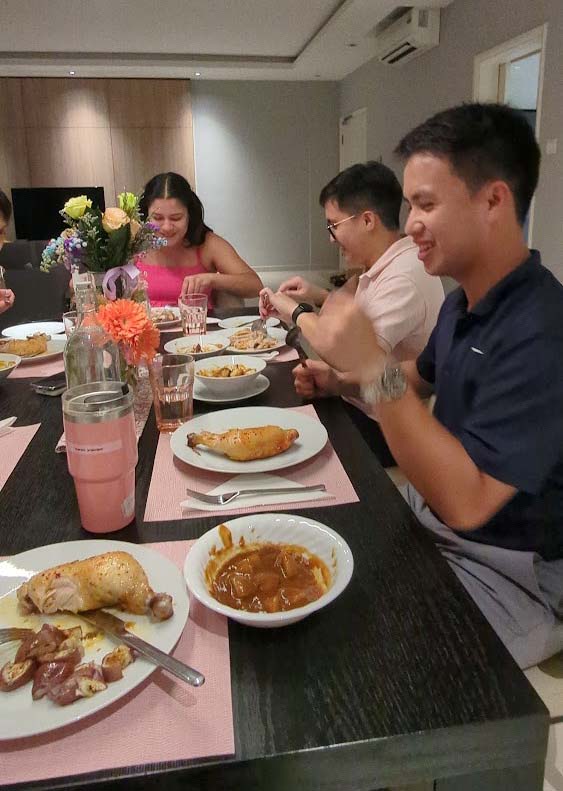
The structured parts of the MBA are valuable. The classes, the exams, Professor Joel’s question about people versus numbers. Those matter. But the parts that felt most worthwhile were the ones I set up myself. The office visit I asked for. The coffee chat I arranged. The sailing lessons I signed up for. The time I made for people.
There’s a line from Ratatouille about how “a great artist can come from anywhere.” Replace “artist” with “connection” and that’s basically it. Good opportunities came from random places: a tech event, a coffee chat, a sailing team, a birthday dinner with roommates.
The MBA is what you make it. Everyone says that, and it’s true but also vague. Here’s what it means: you can do the prescribed path, or you can stay in Singapore when everyone goes to Dubai. You can go to required events, or you can also go to optional ones. You can take the company visits handed to you, or you can create your own.
November showed me that the experiences I’ll remember aren’t the ones I have to do. They’re the ones I choose to do. The best parts come from showing up, asking for things, and being okay with capsizing a few times while you figure it out.
That’s it. That’s November.
The Whiplash Effect
In Operations class, we played the Beer Game, a supply chain simulation where you manage inventory across a distribution network. I had no expectations going in, but my surprising takeaway was this: asymmetric information has exponentially compounding effects. One retailer over-orders slightly. The wholesaler sees the spike and orders more. By week four, everyone’s drowning in inventory nobody needs because the information gets distorted at each step. It’s called the whiplash effect.
I was simultaneously running four group projects with completely different teams—a case competition, an accounting project analyzing a hawker stall’s viability, an economics presentation on a struggling retail company’s Southeast Asia strategy, and a financial case memo on the restructuring of JAL. It occurred to me: this is the simulation. Not for supply chains, but for working across cultures, time zones, and work styles.
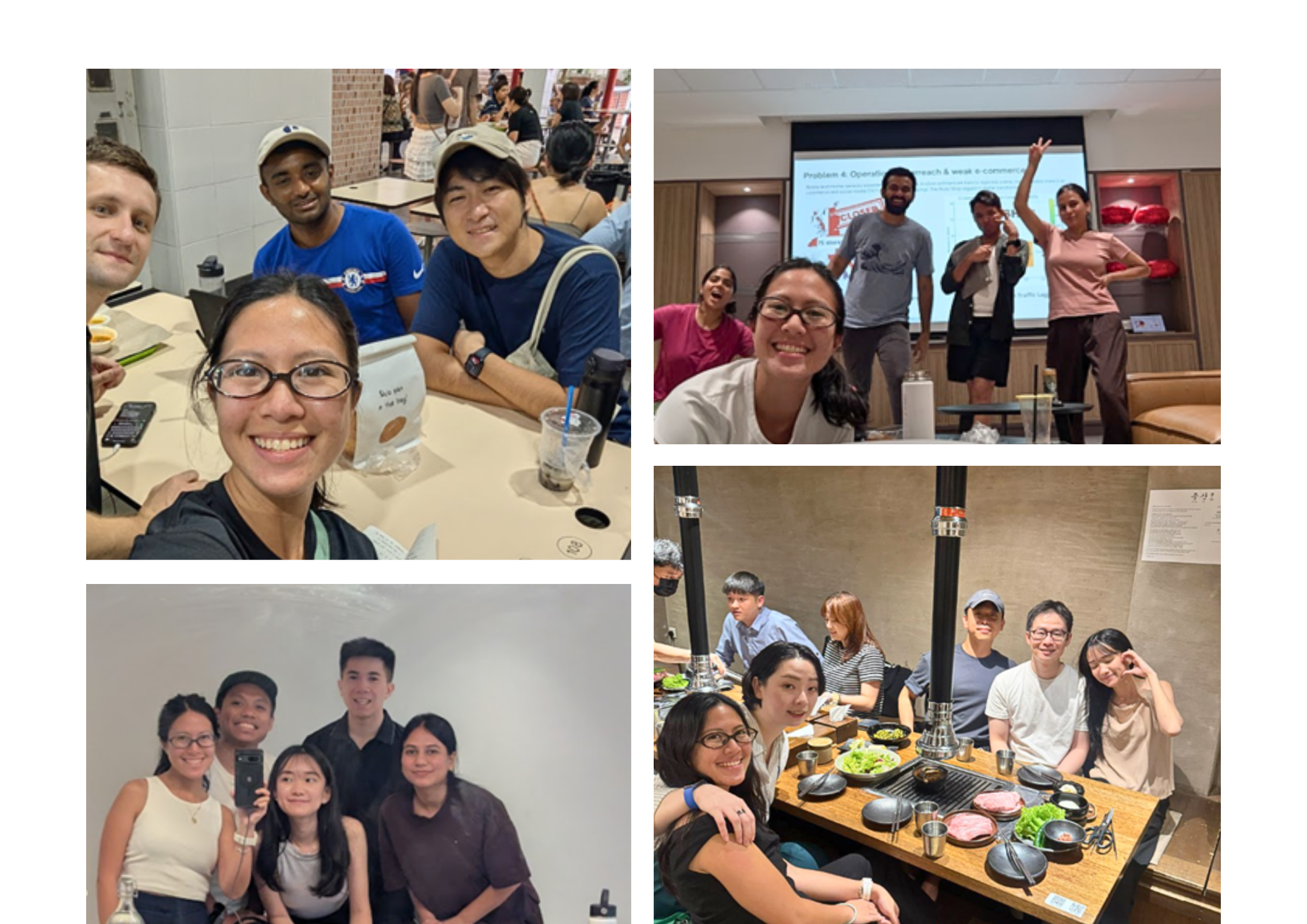
Therese with her Accounting group (upper left), Econs group (upper right), Product Games group (lower left) and Finance group (lower right) – Juggling 4 groups is sure a feat!
Before this, I’d only worked in the Philippines. Same cultural context, same unspoken rules. MBA group work became my first real test of what happens when those assumptions don’t hold.
This all unfolded against a backdrop of constant motion, my first Diwali celebration, classmate’s birthday celebrations, my future in laws visiting Singapore, coffee chats with folks in the private equity space, a talk by the SEA CEO of Coinbase , flying back to Manila for wedding planning, and visiting my new nephew, an NUS networking event at Marina Bay Sands the night before a finance exam (56/60 for me btw), a Women in Tech event where I met Julie, a fellow Filipina at Microsoft who shared frameworks on workplace attitudes with incredible energy. The density made coordination a challenge. I always have to keep reminding myself of what’s important and what’s noise.
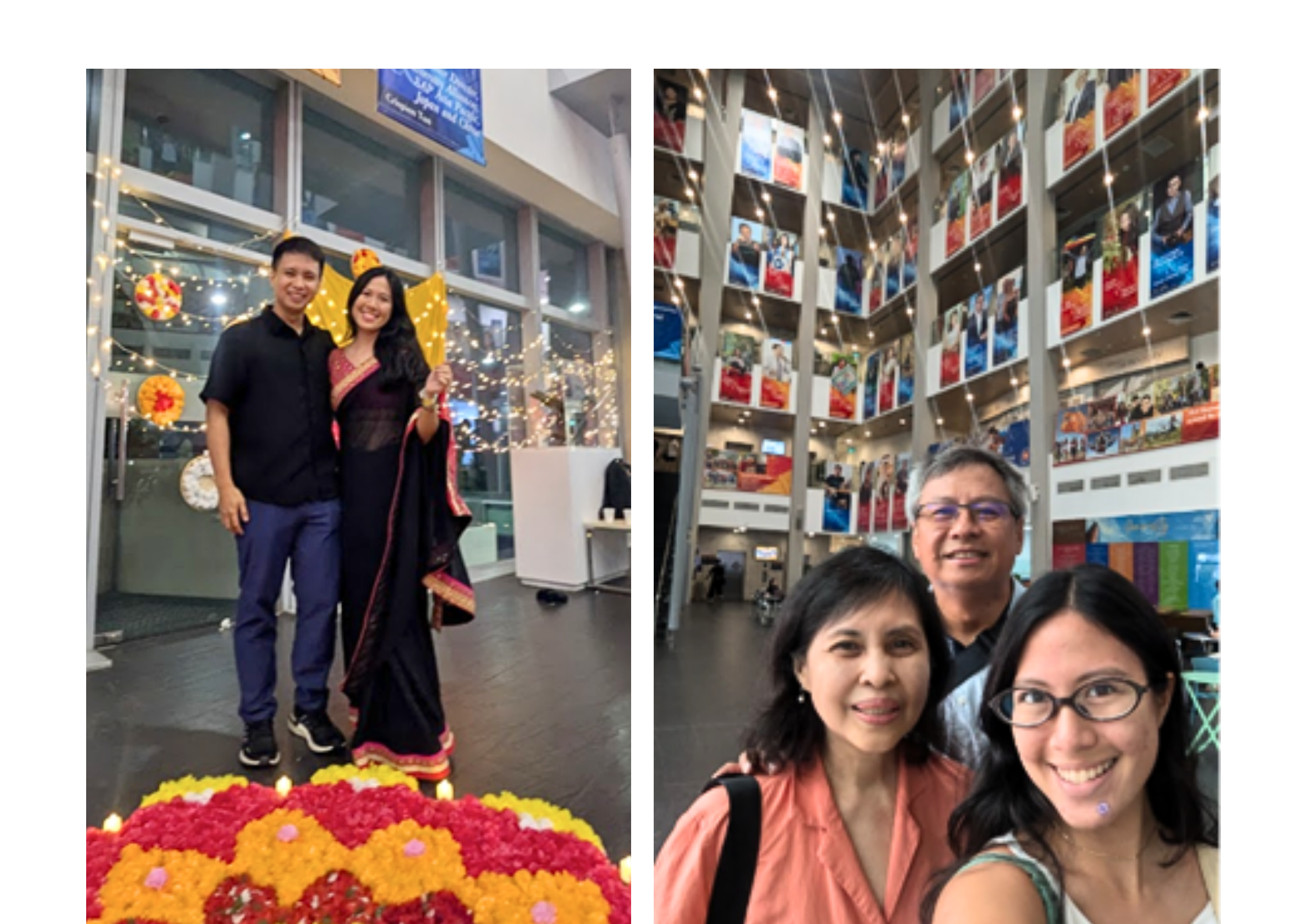
Therese with her fiancé at her first Diwali celebration (left), visiting the NUS Business School campus with her parents-in-law (right)
Going to See for Yourself
What I learned was that as long as we had a plan and clear expectations about energy levels, it worked. No endless back-and-forth trying to coordinate. Instead, we helped each other make decisions by figuring out our roles early.
We made time to visit the hawker center. Saw the actual operations, talked to some owners, understood the constraints.
The economics group was assigned randomly. We were analyzing The Body Shop’s expansion strategy. We took the extra effort on a Sunday to rehearse.
The product games group, we were able chose each other. By October, I’d noticed what I looked for, people who cared, who’d follow through (or could make up for it if they failed to do a task), who could handle direct conversations. We didn’t win, but the process was smooth. No unnecessary 10pm scrambles (although we did have one late night sprint a couple days before the deadline).
What made it work was that we’d talked early about deadlines and working styles. My Canadian teammate, Gabriel, built in buffer time and made sure nothing fell through the cracks. My Indonesian classmate, Gracellyne, still running her full-time business, needed hard deadlines. I wanted tangible checkpoints. Once we named these approaches, we could design around them.
Why People Do What They Do
Here’s what I didn’t expect: people aren’t difficult. They’re operating under different constraints and cultural scripts. Once I saw it this way, group work got easier. I was learning to read patterns I’d never encountered in Manila—not because people are fundamentally different, but because the cultural nuances shift a lot of things. Silence means different things across cultures. “Let’s discuss this” carries different urgency depending on who’s saying it. “Good enough” has no universal definition.
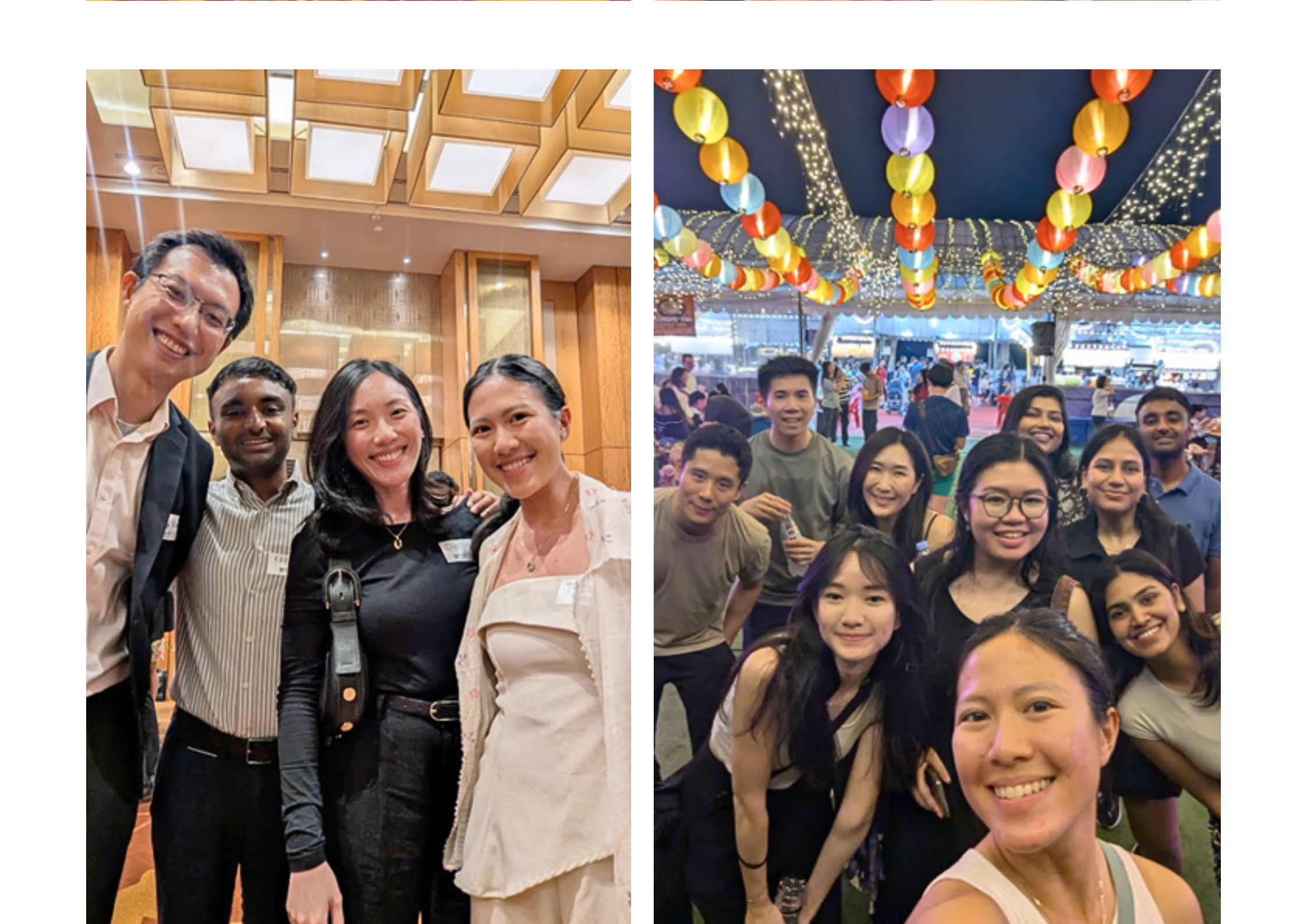
Therese at an NUS MBA networking event at MBS (left), night stroll at Jurong Lake Gardens with her MBA classmates (right)
What the Simulation Teaches You
The whiplash effect happens when information gets distorted, when people aren’t communicating clearly. In the Beer Game, you see the problem from outside. In group work, you’re inside it.
It doesn’t always work smoothly. The accounting group had moments where communication styles clashed. The economics group navigated different expectations about what “good enough” meant. The product games group got lucky, but that taught me what to look for next time.
But that’s the point. These are mini-simulations for working on diverse, global teams. Instead of managing a real project with real consequences, I’m learning to navigate differences on a Body Shop case study or hawker center financial model. Low stakes, high learning.
The Beer Game taught me to see the whiplash effect, how small misalignments compound across a system. Group work taught me how to prevent it: make the implicit explicit before the distortions start. Name the constraints. Surface the different scripts people are running. Design around the differences instead of pretending they don’t exist.
Unlike my jobs in the Philippines, where I could rely on shared cultural context, and where people laughed at my jokes, or at least pretended to, here I’m learning to communicate across differences. The simulation is working so far I think.

Learning Beyond the Classroom: What Singapore Really Teaches You
When I applied to this MBA program, I knew I’d learn frameworks, case studies, and leadership theories. What I didn’t expect was how much Singapore itself would become part of my education, not just as a backdrop, but as a living curriculum in efficiency, connection, and intentional living.
The Infrastructure of Learning
“Things just work in Singapore.” People say it almost like a complaint—efficient, predictable, maybe even boring. But when you live here, you start to understand its quiet power. No last-minute detours. No frantic buffer planning. You just show up. All that mental space that used to go to worrying about logistics turns into room for deeper work and connection.
Especially coming from Manila—where a 15-kilometer car ride can easily take two hours— the contrast is striking. This sense of ease began even before I landed. Processing my student visa was straightforward, with no endless loops or mysterious delays. At Changi Airport, I cleared immigration in minutes. Back home in Manila, efficiency often depends on what status tier you hold. Here, convenience isn’t a privilege; it’s the norm. Everyone gets the smooth experience.
Even the small things signal a different operating system. Grapes at the supermarket cost S$3.15. Back home, the same quality would cost three times more. Public spaces, parks, libraries, sports facilities, are genuinely public and genuinely excellent. Quality of life infrastructure isn’t a luxury; it’s the baseline.
This ethos extends to the program itself. Email a professor with a question? A reply often arrives within hours. Reach out to the BizCareer team? Someone’s available, approachable, and invested. That responsiveness isn’t just convenient, it signals a culture where your learning matters, and support is never far away.
The Network That Forms Naturally
I came to business school knowing networking was important. But I expected it to feel a bit rigid. Instead, I found something more organic and human.
My classmates and I are all navigating the same compressed life stage: career switching, industry hopping, future building. In that shared uncertainty, people talk about the things you can’t Google: cultural cues in interviews, the reality of roles they left behind, what they wish they’d known earlier. These aren’t polished stories, they’re honest, messy insights shared over coffee or late-night study sessions.
The city makes this easier. Singapore is small enough that meeting across town isn’t a two- hour ordeal. Diverse enough that your cohort spans dozens of industries and nationalities. Connected enough that introductions happen naturally. It’s not networking as strategy— it’s community as a natural byproduct of proximity and openness.

Hosting our weekly dinners – It’s Korean night!
Operations at 8:30am: An Unexpected Gift
I’ll admit it, when I saw that Operations was scheduled at 8:30am, I groaned. But it’s become the highlight of my week. Our professor Joel Goh bursts in with “GOOD MORNING” energy that somehow makes early mornings feel less like punishment and more like possibility.
On day one, he already knew our names, not just the list, but our backgrounds and hobbies. That level of preparation isn’t just impressive; it’s a signal of care. It says: you matter. You’re not just a seat number. That transforms the classroom dynamic from transactional to relational.
His facilitation matched that intentionality. We’ve explored everything from health service delivery to boat building to how creativity itself can be operationalized. On paper, the topics sound scattered. In practice, they gave us frameworks that surfaced in unexpected places including a recent case competition. Operations isn’t just about supply chains and efficiency metrics. It’s about understanding how things work and how they can work better.
Building a Life, Not Just a Resume
What I didn’t expect was how much I’d build a life while learning. I went sailing for the first time in Singapore. I’d tried it briefly back home and found a club at National University of Singapore, so I brought some friends along. There’s something grounding about being on the water, skyscrapers in the distance, waves lapping against the hull—a reminder that the ocean doesn’t care about your internship applications or LinkedIn profile.

Joined the NUS sailing club for a fun sail at marina raffles.
These moments matter more than I anticipated. The learning here isn’t just professional— it’s personal. It’s about discovering what sustains you, what brings you joy, what makes a place feel like more than a line on your CV. Singapore has shown me how efficiency and intentionality create room for spontaneity. Good infrastructure supports good living. And being surrounded by ambitious, generous people makes both work and play richer.
What I’d Tell Prospective Students
If you’re considering this program, here’s what I wish someone had told me: Come ready to learn from everything—the coursework, yes, but also the city, your classmates, and the systems around you. Come ready to ask questions and get answers quickly. Build relationships that feel less like networking and more like friendship. Try something new, whether it’s a framework in class or sailing on a Saturday.
Singapore will teach you—but only if you’re paying attention.
